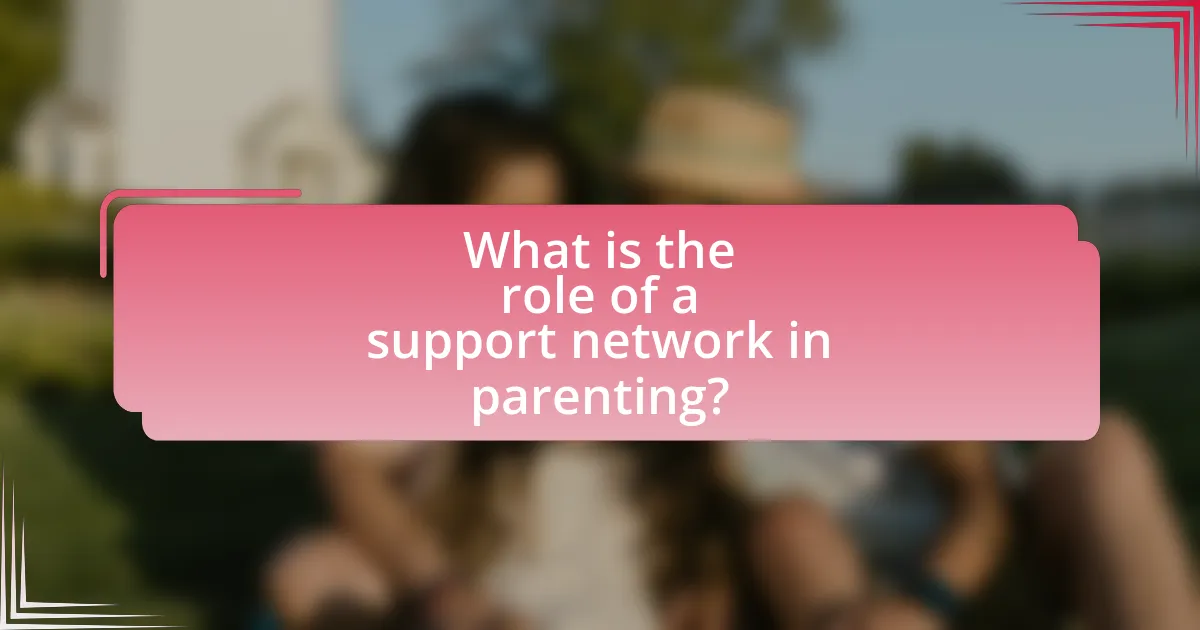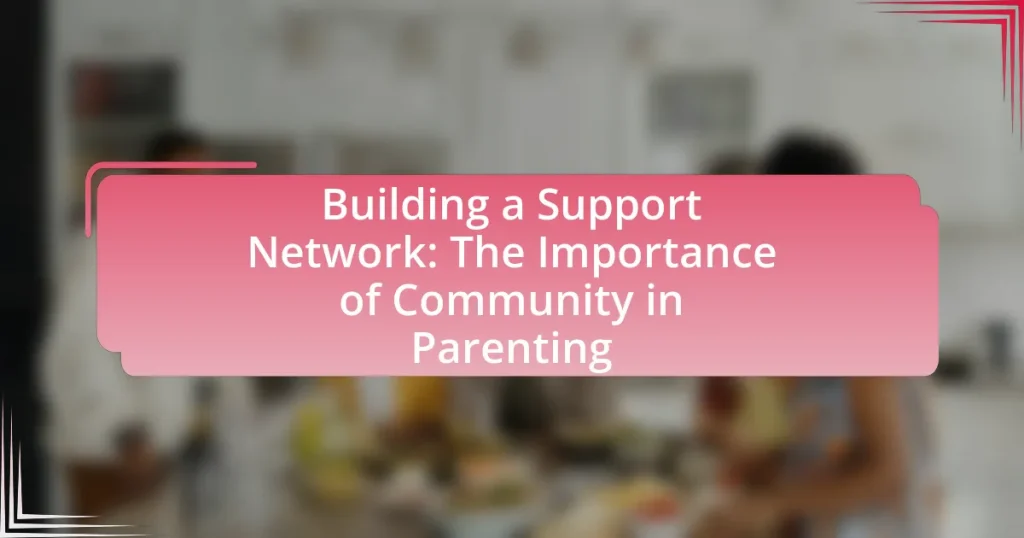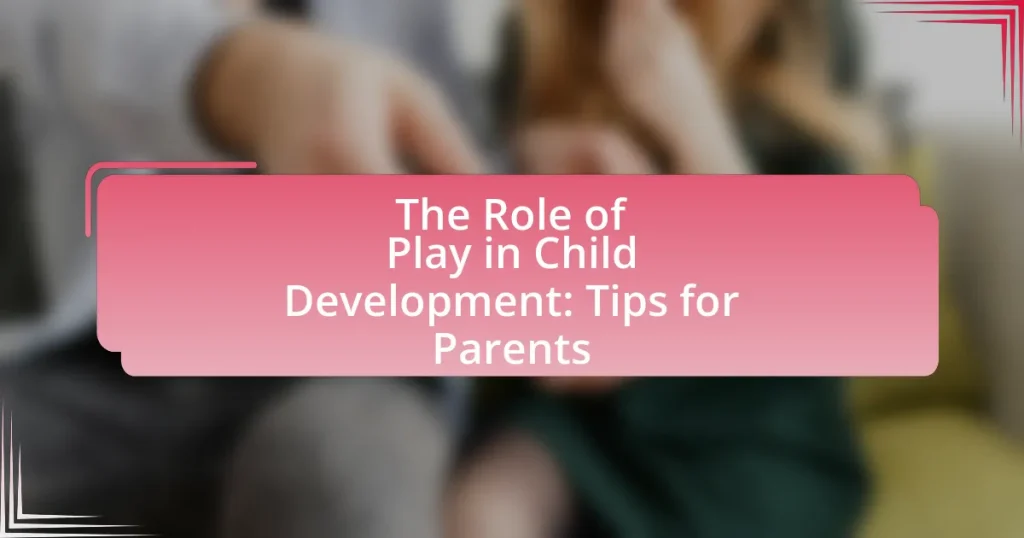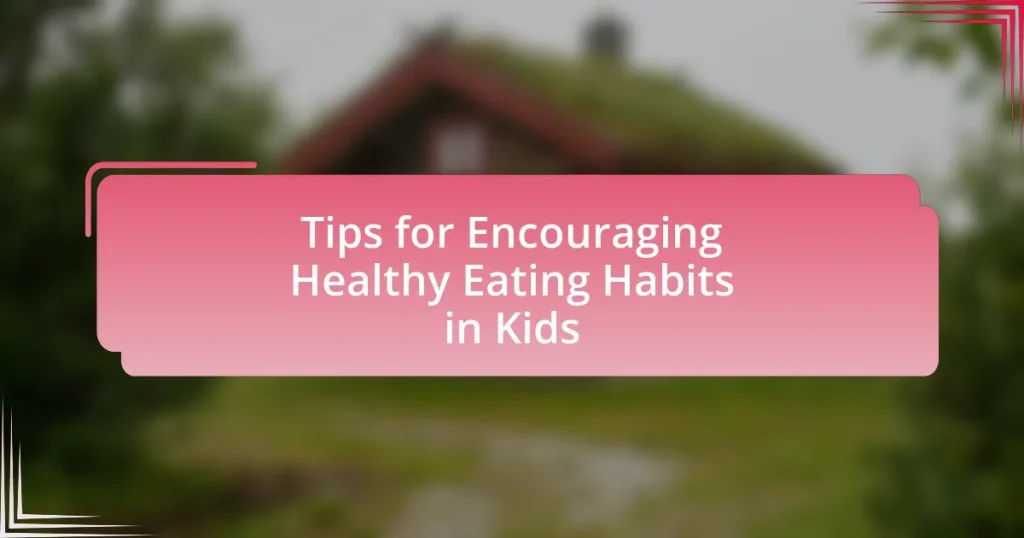The article focuses on the critical role of support networks in parenting, emphasizing how emotional, practical, and informational assistance from family, friends, and community resources enhances child-rearing effectiveness. It highlights the benefits of strong support systems, including reduced stress, improved parenting skills, and enhanced well-being for parents. The article also explores various types of support networks available, such as peer groups and professional services, and discusses strategies for parents to build and maintain these networks. Additionally, it addresses common challenges parents face in establishing connections and offers practical tips for overcoming barriers to community involvement.

What is the role of a support network in parenting?
A support network in parenting provides emotional, practical, and informational assistance, which is crucial for effective child-rearing. This network, comprising family, friends, and community resources, helps parents manage stress, share responsibilities, and gain insights into parenting challenges. Research indicates that parents with strong support networks report higher levels of well-being and lower levels of stress, as evidenced by a study published in the Journal of Family Psychology, which found that social support significantly correlates with parental satisfaction and mental health.
How does a support network benefit parents?
A support network benefits parents by providing emotional, informational, and practical assistance. This network can reduce stress, enhance parenting skills, and improve overall well-being. Research indicates that parents with strong support systems report higher levels of satisfaction and lower levels of anxiety and depression. For instance, a study published in the Journal of Family Psychology found that social support significantly correlates with positive parenting practices and child outcomes, demonstrating the critical role of community in effective parenting.
What emotional support can a community provide to parents?
A community can provide emotional support to parents through shared experiences, encouragement, and resources. This support manifests in various forms, such as parenting groups that facilitate discussions and offer advice, which can alleviate feelings of isolation. Research indicates that parents who engage with community networks report lower stress levels and increased feelings of belonging, as evidenced by a study published in the Journal of Family Psychology, which found that social support significantly enhances parental well-being. Additionally, community events and activities foster connections among parents, creating a sense of camaraderie that reinforces emotional resilience.
How does a support network assist with practical parenting challenges?
A support network assists with practical parenting challenges by providing emotional, informational, and logistical resources. These networks, which can include family, friends, and community groups, offer parents a sense of belonging and reduce feelings of isolation, which is crucial for mental well-being. For instance, studies show that parents with strong support systems report lower stress levels and improved parenting satisfaction. Additionally, support networks can share practical advice on child-rearing, offer childcare assistance, and facilitate access to community resources, such as parenting classes or health services. This collaborative approach not only enhances parenting skills but also fosters resilience in facing daily challenges.
Why is community important in the parenting journey?
Community is important in the parenting journey because it provides essential support, resources, and shared experiences that enhance parenting effectiveness. Engaging with a community allows parents to exchange advice, share challenges, and celebrate milestones, which can reduce feelings of isolation and stress. Research indicates that parents who are part of a supportive community report higher levels of satisfaction and lower levels of anxiety, as they benefit from collective knowledge and emotional backing. For instance, a study published in the Journal of Family Psychology found that social support significantly correlates with positive parenting practices and child development outcomes.
What are the social benefits of having a parenting community?
Having a parenting community provides significant social benefits, including emotional support, shared resources, and enhanced social connections. Emotional support from peers helps reduce feelings of isolation and stress, which is crucial for mental well-being; studies show that parents who engage with community support report lower levels of anxiety and depression. Shared resources, such as parenting tips, childcare options, and educational activities, foster collaboration and knowledge exchange, making parenting more manageable. Additionally, enhanced social connections through community involvement can lead to lasting friendships and a sense of belonging, which are vital for both parents and children. Research indicates that children benefit from social interactions within these communities, leading to improved social skills and emotional development.
How does community involvement enhance child development?
Community involvement enhances child development by providing social support, resources, and opportunities for learning. Engaging with community members fosters a sense of belonging and security for children, which is crucial for their emotional and social growth. Research indicates that children who participate in community activities, such as sports or arts programs, exhibit improved social skills and academic performance. For instance, a study published in the Journal of Community Psychology found that children involved in community programs showed a 20% increase in social competence compared to those who were not. This involvement not only enriches their experiences but also helps them develop critical life skills, such as teamwork and communication.

What types of support networks are available for parents?
Parents can access various types of support networks, including family support, peer support groups, online communities, and professional services. Family support involves assistance from relatives, which can provide emotional and practical help. Peer support groups, often organized locally or through community centers, allow parents to share experiences and advice. Online communities, such as parenting forums and social media groups, offer a platform for parents to connect and seek guidance from others facing similar challenges. Professional services include counseling and parenting classes, which provide expert advice and resources. These networks are essential for fostering resilience and well-being among parents, as studies show that social support significantly reduces stress and enhances parenting skills.
How can parents identify local support groups?
Parents can identify local support groups by utilizing online resources, community centers, and social media platforms. Online directories such as Meetup and Facebook Groups allow parents to search for specific interests or needs, while community centers often host information sessions or have bulletin boards listing local support options. Additionally, local hospitals and pediatricians can provide referrals to established support groups, ensuring parents connect with relevant resources in their area.
What resources are available for finding parenting communities?
Online platforms such as Facebook groups, Meetup, and Reddit provide valuable resources for finding parenting communities. These platforms host numerous groups and forums specifically designed for parents to connect, share experiences, and seek advice. For instance, Facebook has thousands of parenting groups categorized by interests, locations, and parenting styles, allowing users to find communities that align with their needs. Meetup facilitates in-person gatherings for parents, enabling them to build local support networks. Additionally, Reddit features subreddits dedicated to parenting topics, where users can engage in discussions and share resources. These platforms collectively offer diverse avenues for parents to find and join supportive communities.
How do online communities compare to local support groups?
Online communities offer broader accessibility and anonymity compared to local support groups, which provide face-to-face interaction and immediate emotional support. Online platforms allow individuals to connect with diverse groups regardless of geographical limitations, enabling participation from various backgrounds and experiences. For instance, a study published in the Journal of Medical Internet Research found that online support groups can enhance feelings of belonging and reduce isolation, particularly for those unable to attend local meetings due to mobility issues or stigma. Conversely, local support groups foster personal connections and trust through in-person interactions, which can enhance the emotional support experience. Each format has unique advantages, making them complementary rather than directly comparable.
What are the different forms of support within these networks?
Different forms of support within parenting networks include emotional support, informational support, practical assistance, and social companionship. Emotional support involves providing empathy and understanding, which helps parents cope with stress and feelings of isolation. Informational support consists of sharing knowledge and resources, such as parenting tips or child development information, which can enhance parenting skills. Practical assistance includes tangible help, like babysitting or meal preparation, which alleviates daily burdens. Social companionship offers a sense of belonging and connection, reducing loneliness and fostering community ties. These forms of support are essential for effective parenting and overall family well-being.
What role do family and friends play in a support network?
Family and friends serve as essential components of a support network by providing emotional, practical, and social assistance. They offer a sense of belonging and security, which is crucial for mental well-being, especially in parenting contexts. Research indicates that social support from family and friends can reduce stress and improve overall health outcomes, as evidenced by a study published in the Journal of Family Psychology, which found that strong familial ties correlate with increased resilience in parenting challenges. This support network not only helps in sharing responsibilities but also fosters a nurturing environment that enhances child development.
How can professional services contribute to a parenting support network?
Professional services can enhance a parenting support network by providing expert guidance, resources, and structured programs tailored to the needs of parents. These services, which include counseling, parenting classes, and workshops, equip parents with essential skills and knowledge, fostering a sense of community and shared experience. Research indicates that access to professional support can significantly improve parenting practices and child outcomes, as evidenced by studies showing that parents who engage with professionals report higher levels of confidence and satisfaction in their parenting roles.

How can parents effectively build their support network?
Parents can effectively build their support network by actively engaging with local community resources, such as parenting groups, schools, and social services. By participating in these groups, parents can connect with other caregivers who share similar experiences and challenges, fostering relationships that provide emotional and practical support. Research indicates that parents who engage in community networks report higher levels of satisfaction and lower stress levels, as these connections offer shared resources and advice. For instance, a study published in the Journal of Family Psychology found that social support significantly enhances parenting practices and child development outcomes.
What steps can parents take to connect with others?
Parents can connect with others by actively participating in community events and local parenting groups. Engaging in activities such as school functions, playdates, or neighborhood gatherings allows parents to meet others with similar interests and challenges. Research indicates that social support is crucial for parenting, as it can reduce stress and improve overall well-being. For instance, a study published in the Journal of Family Psychology found that parents with strong social networks reported higher levels of satisfaction and lower levels of parenting stress. By fostering relationships through these avenues, parents can build a supportive community that enhances their parenting experience.
How can parents leverage social media to find support?
Parents can leverage social media to find support by joining parenting groups and communities that align with their specific needs and challenges. These platforms, such as Facebook, Reddit, and Instagram, offer spaces where parents can share experiences, seek advice, and connect with others facing similar situations. Research indicates that 70% of parents use social media to find parenting resources and support, highlighting its effectiveness as a tool for building a supportive network. By actively participating in discussions and sharing their own experiences, parents can foster connections that provide emotional support and practical advice, enhancing their parenting journey.
What strategies can parents use to maintain relationships within their network?
Parents can maintain relationships within their network by actively engaging in regular communication and organizing social gatherings. Consistent communication, such as phone calls, texts, or social media interactions, helps keep connections strong and fosters a sense of belonging. Organizing events like playdates, family outings, or community activities encourages face-to-face interactions, which are crucial for building trust and rapport. Research indicates that social support networks significantly enhance parental well-being, as highlighted in a study published in the Journal of Family Psychology, which found that parents with strong social ties report lower stress levels and improved parenting satisfaction.
What challenges might parents face in building a support network?
Parents may face several challenges in building a support network, including time constraints, lack of access to resources, and social isolation. Time constraints arise from the demands of parenting, which can limit opportunities to connect with others. Lack of access to resources, such as community centers or parenting groups, can hinder parents from finding support. Additionally, social isolation, often exacerbated by geographical distance or personal circumstances, can make it difficult for parents to establish meaningful connections. These challenges are supported by research indicating that many parents report feeling overwhelmed and disconnected, highlighting the need for accessible support systems.
How can parents overcome feelings of isolation?
Parents can overcome feelings of isolation by actively seeking and engaging in community support networks. Joining local parenting groups, participating in community events, or utilizing online platforms can provide opportunities for social interaction and shared experiences. Research indicates that social support significantly reduces feelings of loneliness and enhances emotional well-being among parents, as highlighted in a study published in the Journal of Family Psychology, which found that parents with strong social networks reported lower levels of stress and isolation.
What are common barriers to joining a parenting community?
Common barriers to joining a parenting community include lack of time, feelings of inadequacy, and fear of judgment. Parents often struggle to find time due to busy schedules, making it difficult to participate in community activities. Additionally, many parents may feel inadequate in their parenting skills, leading to reluctance in engaging with others. Fear of judgment from peers can further inhibit participation, as parents worry about being criticized for their choices. These barriers are supported by research indicating that social anxiety and time constraints are significant factors affecting community involvement among parents.
What practical tips can parents use to strengthen their support network?
Parents can strengthen their support network by actively engaging with local community resources and fostering relationships with other parents. Joining parenting groups, attending local events, and participating in school activities can create opportunities for connection. Research indicates that parents who engage in community activities report higher levels of support and satisfaction in their parenting roles. Additionally, utilizing social media platforms to connect with local parenting groups can facilitate ongoing communication and support.
How can parents initiate conversations with potential support network members?
Parents can initiate conversations with potential support network members by expressing their needs and interests openly. This can be done through informal settings such as community events, school functions, or social gatherings where they can engage in casual dialogue. For instance, parents might start by sharing their experiences or challenges in parenting, which can prompt others to share their insights or offer assistance. Research indicates that open communication fosters stronger relationships; a study published in the Journal of Family Psychology highlights that parents who actively seek support are more likely to build effective networks.
What activities can parents engage in to foster community connections?
Parents can engage in activities such as organizing neighborhood playdates, participating in local volunteer opportunities, and joining community groups to foster community connections. These activities encourage social interaction among families, strengthen local ties, and create a support network. For instance, research from the American Psychological Association indicates that community involvement enhances parental well-being and child development by providing social support and resources.















